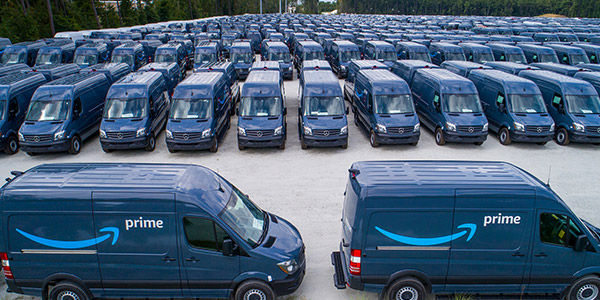Seattle-based Amazon — one of the nation’s largest employers with a huge fleet of trucks and planes — threw its support this week behind a Washington bill to trim carbon emissions from motor vehicle fuels sold in the state.
If passed, House Bill 1091 would mandate that carbon emissions from gasoline and diesel fuel sold in Washington be cut by 10% below 2017 levels by 2028 and by 20% by 2035. (See Wash. House Tackles Bill to Cut Vehicle Emissions.)
The House passed the bill 52-42 on Feb. 27 with five Democrats joining 41 Republicans in opposing it. The bill is now in the Senate’s Environment, Energy & Technology Committee.
In a Monday email to Gov. Jay Inslee, Kara Hurst, Amazon’s vice president for worldwide sustainability, wrote that the company in 2019 adopted a goal of producing a net-zero carbon emissions by 2040 — 10 years ahead of the deadline set by the Paris climate accords.
“Amazon is already making significant changes to decarbonize our own operations and specifically our transportation fleet. We established a ‘Shipment Zero’ goal to make all Amazon shipments net-zero carbon, with 50% of shipments net-zero carbon by 2030. In support of this goal, in 2019, Amazon ordered 100,000 new electric delivery vehicles from Rivian, a U.S. electric vehicle manufacturer, which we are already beginning to deploy,” Hurst wrote.
She added: “We believe the [low-carbon fuels standard] will accelerate the transition to sustainable fuels and vehicles and enable Washington state to serve as a national leader in transportation decarbonization. Climate change is real … and actions like these are needed from the public and private sectors.”
Amazon employs roughly 750,000 workers at several locations in the U.S. and around the world. The company made $386 billion in sales in 2020, according to its filings with the U.S. Securities and Exchange Commission.
Inslee requested that Rep. Joe Fitzgibbon (D), chairman of the House Environment and Energy Committee, introduce HB 1091.
The bill builds on a 2008 law that directed the state to reduce its overall CO2 emissions to 90.5 million metric tons, the level in 1990, by 2020. A state report shows Washington’s carbon emissions at 99.57 million metric tons in 2018 — the last year that figures are available. The same 2008 law sets carbon-reduction targets of 45% below 1990 levels by 2030, 70% by 2040 and 95% by 2050.
A month ago, Fitzgibbon noted that 42% of Washington’s carbon emissions comes from motor vehicles.
The Western States Petroleum Association opposes the legislation. However, the owner of one of Washington’s five refineries — BP America — has voiced neutrality on the bill while supporting the state’s goal of trimming emissions by 95% by 2050.
A major issue for those against the bill is how much decarbonized motor fuel will cost at the pump.
The Association of Washington Business — the state’s largest business organization — has argued that decarbonization will add 20 to 60 cents per gallon to gasoline prices. Meanwhile, the Washington Department of Ecology has said California’s fuel decarbonization efforts resulted in a 1% increase in gas prices, while Oregon’s efforts resulted in a 2% change.
Opponents testified last month that claims of improving air quality are exaggerated, saying it would cost jobs and send business out of the state. They also contended that proposed standards would hit poor people hard and cause the trucking industry to add surcharges to shipments. Some said low-carbon fuels should be included in the legislature’s upcoming package of bills and appropriations addressing transportation, rather than addressed separately.
Supporters argued that carbon pollution has harmful health effects and disproportionately affects low-income communities as well. They added that there is great potential in Washington to grow the low-carbon fuels industry and that a clean fuels program should try to include rebates to buyers of electric vehicles.




